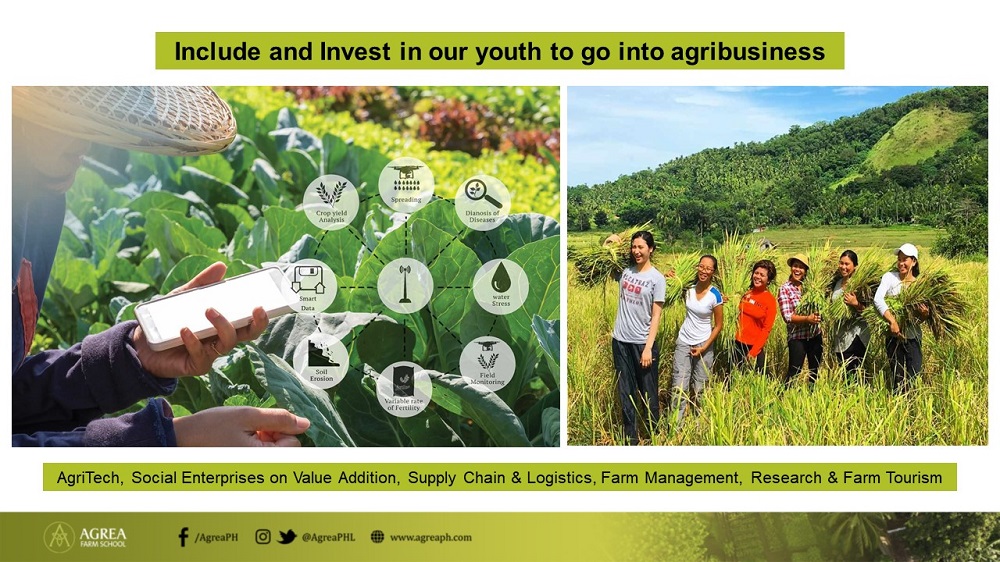
April 15, 2021 Thursday

There is a need to change the narrative of agriculture to encourage more youth to go and venture agribusiness. Photo from the PowerPoint presentation of Ms. Cherrie Atilano, Founder and CEO of AGREA Agricultural Systems International, Inc.
MANILA, 16 April 2021 — Plant-based nutrition advocates highlighted the benefits of shifting to a plant-based diet, growing your own food, providing help for our farmers, and making ourselves healthy in the midst of climate and health crises during the 41st episode of “Stories for a Better Normal: Pandemic and Climate Pathways,” with the second part of the topic, “Oh My Gulay!”
The online conversation hosted by three-term Senator, now Deputy Speaker and Antique Representative Loren Legarda, featured sustainable food enthusiasts including Cherrie Atilano, Founder and CEO of AGREA Agricultural Systems International; Roni Matalog, Founder of Plants & Purpose; Chef Lilibeth “B” Camposano, Founder of The Sexy Kitchen by B; and Adolf Aguilar, Chief of Youth Formation Division of the Department of Education (DepEd).
The guests discussed why healthy diets, sustainable food systems, and regenerative farming are needed in pursuing green recovery from the COVID-19 pandemic, and shared practical tips to start a plant-based journey. They also highlighted how a balanced diet through plant-based food and reducing food waste can present major opportunities to mitigate climate change and adapt to its impact. The success stories of Gulayan sa Paaralan of DepEd and how it has been complemented by the Gulayan sa Tahanan program were also given emphasis during the episode.
“Ang pagpapatubo natin ng pagkain ay hindi dapat nakasisira sa kalikasan, hindi rin dapat nakasisira sa kalusugan, at dapat nakako-contribute ito sa ekonomiya ng ating bansa. Food is the new internet kasi it connects all of us. It should also propel us to do good. Palagi nating alalahanin ang ating mga magsasaka at mangingisda, na sila ang ating heroes,” said Atilano.
“How can we start a plant-based journey? Identify your purpose, ano ‘yung intention mo or reason, learn actively, take action, focus on your nourishment instead of considering it only as a diet, thrive on your journey and lifestyle, and get social support,” said Matalog.
“Kailangan nating malaman na dahil sa pag-unlad ay masyadong bumibilis ang pagproseso ng pagkain. Sa ating pangangailangang kumain, maraming nasisira, nakalilimutan na ang social responsibilities sa paggawa ng pagkain. Nagkakaroon tayo ng pollution, animal abuse, obesity, and mental health diseases. Nagkakaroon tayo ng global warming because of our food production – pagkasira ng lupa, deforestation, and human food waste,” said Chef B.
“Ang Gulayan sa Paaralan will ensure that our schools will have a steady supply of vegetables. Through this, kapag nakita nila sa paaralan, gagayahin din ito ng families sa kani-kanilang mga tahanan. Isa sa mga magandang naidulot ng pandemic ay nagkakaroon ng panahon at opportunity na magtanim at mag-grow ng sariling gulay ang families, ang ating teachers, kaya medyo masagana po ang ani sa ating mga gulayan lalo na sa mga probinsya,” said Aguilar.
Legarda reiterated that not only farmers, LGUs, schools, and chefs can have their own vegetable farm. Everyone can be self-sufficient and sustainable by learning urban gardening in the time of pandemic and growing their own food to sustain their basic needs.
"Hindi naman kailangan ng napakalaking budget para magkaroon ng sariling gulayan. Ang importante lang, may kaunting lupa. Puwede tayong magtanim sa naresikulong bote, lata, o plastik. ‘Yung ating food wastes at dried leaves ang ginagawang organic fertilizer. We save seeds, tayo ay nagpapatuyo ng mga buto galing sa ating kinakain at ‘yun ang siyang ipapasibol. If we institutionalize ‘yung segregation of waste at source, recycling, at tayo ang gagawa ng sariling compost at magse-save ng seeds na itatanim, sigurado akong hindi napakalaking budget ang kailangan," Legarda concluded.
As an online discussion to promote health, environmental consciousness, and climate-adaptive practices, "Stories for a Better Normal" aims to change the mindset of individuals, families, and communities by demonstrating ways in which a ‘better normal’ can be realized within our communities.
This online discussion is organized in partnership between the Office of Deputy Speaker Legarda and the Climate Change Commission, with support from the Department of Education, Philippine Information Agency, Institute for Climate and Sustainable Cities, The Climate Reality Project-Philippines and Mother Earth Foundation.